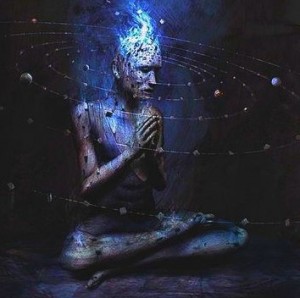When the quantum theory was being formulated, Einstein was already a world famous physicists and his opinion carried a lot of weight. Unfortunately the basic ideas of quantum theory did not gel with Einstein and he was radically opposed to them. In a famous statement Einstein said, “I don’t believe God plays dice with the Universe”. Einstein did not like the probabilistic nature of the equations that described the behavior of atoms and molecules. His guts told him that “Reality could not behave in such a manner” and though the weight of scientific evidence pointed in this direction he opposed the new theories. Einstein was eventually sidelined and Quantum theory came to become accepted.
This story illustrates that scientists are humans and they have biases like the rest of us. This makes accepting new ideas that work against prevailing bias difficult. Max Plank summed this up as follows:
“New scientific truth does not triumph by convincing its opponents and making them see the light, but rather because its opponents eventually die, and a new generation grows up that is familiar with it.”
The case of Dr. Ignaz Semmelweis is illustrative. He was a Hungarian Doctor who lived in the early nineteenth century. He discovered that if doctors would wash hands in obstetrical clinics before examining their patients that would reduce incidence of puerperal fever. In those days puerperal fever was common and there was a mortality rate of about 20% as a result. Unfortunately fellow doctors rejected his ideas, even after he published is findings in various publications showing that the practice of washing hands could reduce mortality below 1%. It was only after his death that his ideas gained widespread acceptance, while in the meantime countless patients died needlessly.
In a recent controversial TED talk noted scientist Rupert Sheldrake showed the since the past 400 years science has been operating under a “materialistic worldview”. This means that there are hidden biases under which scientists work and this colors their findings. If there is any evidence that goes contrary to these “basic assumptions” such evidence is summarily rejected. Rupert Sheldrake called these the “10 dogmas of Science”. Primary amongst this dogma was the view that Consciousness was a mirage. Consciousness is viewed as some kind of interesting but non-significant property of the brain. This dogma severely restricts the deeper exploration of Consciousness and attempts to negate the evidence that point towards the deep roots of Consciousness in everything around us.
Since the materialistic framework is well entrenched it will be a long battle to unshackle from it, but once this happens a new age will dawn. This will be the “Age of Consciousness”, where humans will tap into the tremendous power of Consciousness. Currently our society operates on a materialistic framework where we seek to increase happiness of our citizens by providing for material comforts. The Age Of Consciousness will work on a new framework. Under this framework societies will attempt to increase happiness of their citizens by deepening their Consciousness experience.
Just as the Stone Age did not end because we ran out of stones and had no further use for them, the end of materialism as a dominant paradigm will not mean that humans will give up everyday material comforts. Rather we will build upon this framework so that providing for material comforts would be viewed as a starting point for happiness rather than an end in itself, as it is today.
The Yogis of today are at the vanguard of a new age that is dawning upon us. The spread of Yoga, as a science of consciousness, will hasten the ushering of the new age. The prevailing materialistic paradigm will eventually give way to a new paradigm that will recognize Consciousness as a fundamental “building block” of reality. So when you do yoga or teach yoga keep in mind that you are at the tip of the spear that is moving humans into a new age.
Related:
Surface Dweller Or Deep Swimmer?
The Fourth State Of Consciousness
Why Yoga Matters
Credits:This has been written by Raj Shah and edited by Ketna Shah.

